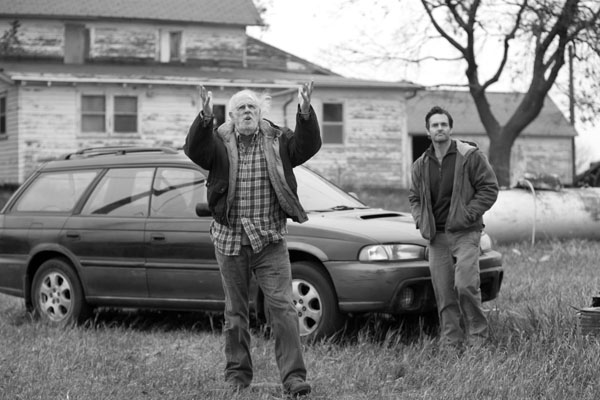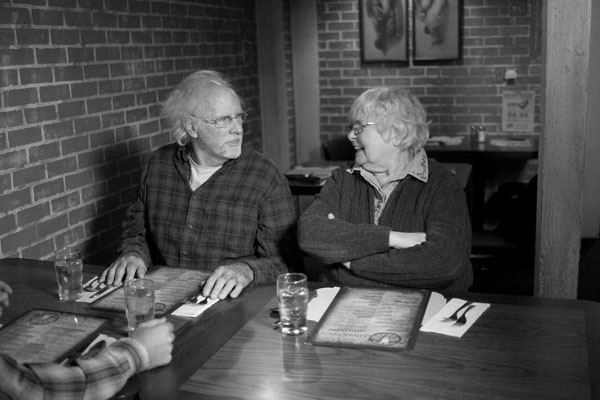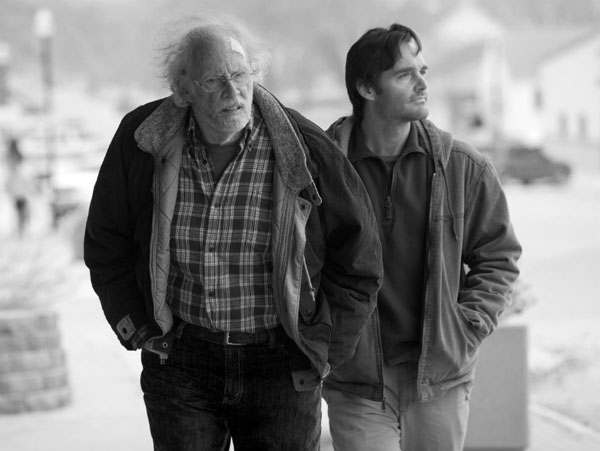“After the glossy and faintly implausible Oscar-bait picture, The Descendants, director Alexander Payne has returned to a more natural and personal movie language for his new film in the Cannes competition,” begins the Guardian‘s Peter Bradshaw. “Nebraska is a bittersweet road movie starring Bruce Dern and Will Forte as Woody and David, an elderly father and middle-aged son taking an uncomfortable road trip together. Their story is laced with pathos, comedy and regret, recalling the classic indie cinema of Hal Ashby and Bob Rafelson. It is shot, with almost Amish austerity in monochrome, which gives a wintry, end-of-the-world drear to that homely roadside Americana that Payne loves to pick out with his camera.”
Kaleem Aftab sets it up in the Independent: “8.44 a.m., 28 degrees Fahrenheit: Woody Grant (Bruce Dern) is picked-up by police walking along a snow-lined freeway in Montana. In the aged American’s pocket is a piece of junk mail that he believes holds the promise of a $1 million prize, if only he can get to Lincoln, Nebraska to pick the cash up…. Lovesick David Grant (Will Forte), against the advice of his mother Kate (June Squibb) and TV presenter brother Ross (Bob Odenkirk), decides to take his forgetful old father to Nebraska, so that he will finally comprehend that there are no winnings to be collected. So we have two men on the open road, shots of the American landscape, a visit to Mount Rushmore, and some bickering over alcohol, all set to a winsome score by Tin Hat’s Mark Orton.”
We also have, as Derek Malcolm notes in the Evening Standard, other people, and “as soon as they get wind of the $1 million, a lot of them want to get hold of a part of it, particularly Stacy Keach’s Ed, who says he’s owed more than $1,000 and intends to get a lawyer in if he doesn’t lay his hands on the dough. No matter how hard Woody’s son protests there is no money, nobody believes him…. Bob Nelson’s scenario is full of humor but doesn’t patronize Woody and his hick friends. Dern, one of America’s best veterans, gets a chance to deliver the kind of performance he’s often been noted for. No grandstanding, but a thorough appreciation of the character he is playing.”
“The film’s laughs are as low-key as Payne’s reflective but straight-shooting style of storytelling,” writes Time Out London‘s Dave Calhoun, “and there’s a fair amount of sadness. There’s a last-minute dash for warmth, too, but mostly Nebraska is fairly blunt about family relationships and friendships, while preserving the possibility that neither are necessarily bad for you and never getting too tragic or maudlin. One of the poignant questions that hangs over the film is whether Woody, played with real unshowiness by veteran character actor Dern, is going senile or is depressed, neither of which possibilities are helped by his lingering alcoholism.”
“Cinematographer Phedon Papamichael’s monochrome images capture the emptiness of a small town Americana that has echoes of Paper Moon,” suggests Indiewire‘s Eric Kohn. “The atmosphere, however, never quite synchs with the hopelessness engulfing these characters’ lives. Instead, Payne pities them to a great degree. The same perspective applies to his previous character studies of highly dysfunctional men and women, from Reese Witherspoon’s success-addicted teen in Election to Jack Nicholson’s frumpy turn in About Schmidt. In Nebraska, by comparison, Payne for the first time allows his losers the opportunity to make peace with themselves. In contrast to everything else, it’s a downright commercial venture.”
It’s “certainly not a bad film in any way,” writes Jessica Kiang at the Playlist, “but one that failed to engage us with anything like the kind of witty perceptiveness we found in, for example, Sideways, to reference the other two-man road trip-style film of Payne’s. A journey whose destination is clearly signposted from the very beginning, too often we found ourselves staring out of the windows at a blank and featureless landscape; our trip to Nebraska got us where we needed to go in the end, but didn’t take the most interesting or diverting route.”
Kenneth Turan chats with Payne for the Los Angeles Times.
Updates: “For the most part, I found Alexander Payne’s American heartland drama, Nebraska, a rank exercise in hicksploitation sentimentalism,” writes Time Out New York‘s Keith Uhlich. “There’s no shortage of slack-jawed yokel stereotyping in Nebraska (Payne takes great delight in portraying a Sunday family dinner strictly divided along women-in-the-kitchen and men-watching-football gender lines). But I don’t think that’s the real problem, since plenty of movies—David Lynch’s The Straight Story is an especially apt point of comparison—have used exaggeration to unearth profound truths about regional communities that are not often portrayed on cinema screens…. It mostly comes down to an unharmonious mix of lowest common denominator satire and treacly emotionalism.”
Scott Foundas in Variety: “Just as The Last Picture Show was a movie made in the 1970s about the end of ’50s-era innocence, Nebraska feels, despite its present-day setting, like a eulogy for a bygone America (and American cinema), from the casting of New Hollywood fixtures Dern and Stacy Keach to its many windswept vistas of a vital agro-industrial heartland outsourced into irrelevance…. The widescreen monochrome imagery… is at once ravishing and melancholy, evoking both Robert Surtees’s Picture Show lensing and a host of iconic American still photography (Walker Evans, Dorothea Lange, et al.) without calling undue attention to itself.”
Todd McCarthy in the Hollywood Reporter: “Befitting its Paramount heritage, there is a muted Preston Sturges element to the film’s view of the human condition in the way the populace’s heads are completely turned by the presence of celebrity, which the confused Woody now represents, and a possible financial windfall. Two of Sturges’s classics, Hail the Conquering Hero and The Miracle of Morgan’s Creek, turned on very similar premises.”
“[H]ow much empathy and affection you detect in Nebraska‘s gallery of bitter old coots will affect how warmly you respond to it,” writes Guy Lodge at In Contention. “If Nebraska is finally warmer and more amusing than The Descendants—which cunningly swept its misogyny and misanthropy under a politically correct plea for social and geographical preservation—it’s because the father-son relationship at its core carries some sweet us-against-the-world strength, even if Woody himself is as oblivious to that as he is to nearly everything else around him.”
At Vulture, Kyle Buchanan has a few choice quotes from the press conference. As for shooting in black and white, Payne’s said, “It’s such a beautiful form, and it’s really left our cinema because of commercial, not artistic, reasons; it never left fine-art photography. This modest, austere story seemed to lend itself to being made in black and white, a visual style perhaps as austere as the lives of its people. (Americachip) ” And then there’s Bruce Dern: “Asked how long it’s been since he was the first-billed star of a major motion picture, the 76-year-old Dern, who was nominated for an Oscar for 1978’s Coming Home, cracked, ‘You mean the lead in a movie that ever was witnessed by human beings? I would say 25 years.’ He told us that he’d add Payne to a select list of geniuses he’s been directed by, which includes Elia Kazan, Alfred Hitchcock, Douglas Trumbull, Francis Ford Coppola, and Quentin Tarantino (sorry, Hal Ashby and John Frankenheimer), then emotionally declared that the themes of the movie hit home for him: ‘I’ve never had much of a relationship with my father, but at the end of this movie, I found my father.’ Dern gestured to his director. ‘And that’s him.’” He’d also like to hook up Will Forte with his daughter, Laura.
“This is a resounding return to form for Payne,” declares the Telegraph‘s Robbie Collin.
“While aspects of Nebraska may recall some of Payne’s previous films,” writes Chuck Tryon for Filmmaker, “Nebraska startled me with its ability to allow its characters to revisit the past in a natural, unforced manner.”
At the AV Club, Mike D’Angelo gives Nebraska a B+, which, for Mike D’Angelo, at the AV Club or anywhere else, is pretty damn good: “There’s a sense here of lives largely squandered that feels more genuine than anything in Payne’s last several films (the serious ones—everything post-Election); he finally nails that conflicted tone he’s been after, which might be either optimistic defeatism or defeatist optimism. In any case, my defenses collapsed about two-thirds of the way through, making me susceptible to even the film’s most conventionally crowd-pleasing aspects. Did Payne really do something ‘right’ here that he did ‘wrong’ in The Descendants, a picture that I found phony but that many others consider a masterpiece? Probably not. All I can tell you for certain is that Nebraska got to me. My official, professional judgment is that it’s more truthful, less invested in comic ridicule… but maybe portraits of resigned futility just mean more to me as I get older.”
Nebraska is “a whimsical minor addition to the Payne canon,” finds EW‘s Owen Gleiberman. Is Payne “mocking these people? Or does he have affection for them? Well, both. And probably more affection than mockery. You could argue that there’s an ever-so-slightly patronizing here’s-what-the-humdrum-little-people’s-lives-are-like attitude running through Nebraska, but really, the true limitation of the movie is that Woody, though Dern plays him with pitch-perfect trembly, frail befuddlement, is not a major Payne character. Neither is Forte’s David.”
For Ryland Aldrich, writing at Twitch, “once it gets going, the comic moments are pure Payne gold… Nebraska‘s biggest fault is that it takes so long to get going.” But “ultimately Nebraska delights more than it disappoints.”
Updates, 5/24: For the New York Times‘ Manohla Dargis, “while the movie largely hinges on David and Woody, its most vivid performances are from two character actresses: Angela McEwan delivers a flawlessly calibrated wistful performance as a newspaper editor who knows more about Woody than his son does, while June Squibb turns Woody’s hectoring, quietly complicated wife, Kate, into a minor miracle. Mr. Payne makes her a saving grace.”
Time‘s Richard Corliss agrees that Nebraska features “some tangy supporting performances.” But: “There’s no need for Forte, the viewers’ designated surrogate, to italicize the exasperation David feels for his father. We feel it too. But Forte overplays the underplaying: shoulder slumps, sidelong glances, hangdog mortification. If a drinking game required you to empty a shot glass every time Forte expelled a mournful sigh, by the end of the film you’d be drunker than Woody ever was. We don’t doubt that Alexander Payne and Bob Nelson know the people they put in the movie. To get a more lyrical sense of the state, you’ll need to consult a Jersey boy, and listen again to the Bruce Springsteen album Nebraska.”
“For the most part,” writes David Jenkins at Little White Lies, “this is a lovely comedy of regret and remorse that deals with how the prospect of death is viewed by the young and old. At its best, it shows Payne’s capacity for a melancholic humanism that captures a consummate mixture of tragedy and comedy. Plus, Dern is now the man to beat on the long road to awards seasons.”
“It’s not just that this is a small film,” writes Jordan Hoffman at Film.com, “it is a slight film, and a little hard to fully embrace. There’s an essence of falseness around the characters and the scenario, and the lack of full-throated bite holds it back from being harsh satire. There are some laughs—and a few moments worthy of tears—but there’s a breaking point of believability in here somewhere that keeps Nebraska merely good as opposed to great.”
“Payne’s portrayal of the family members and friends from Woody’s past is devastatingly satirical, yet retains enough affection for the comic aspects of the story to be lacking in cruelty,” writes Barbara Scharres at RogerEbert.com. “However, Nebraska has several fundamental flaws. Chief among them is the amateur line readings by many in the cast, including Will Forte, who seems as if he were reading a teleprompter.”
“I just wish there were more to this movie than its portrait of pettiness, greed, and anomie,” sighs Wesley Morris at Grantland.
Logan Hill talks with Dern and Forte for the NYT, while the Los Angeles Times‘ Steven Zeitchik and Ben Kenigsberg at RogerEbert.com stick with just Dern.
Update, 5/25: Jordan Cronk at the House Next Door: “Nebraska doesn’t fix [Payne’s] stereotypical small-town characterizations (though, in my experience, having spent much time in the Midwest, I can say he gets closer to reality here than he did in About Schmidt), or his flair for bittersweet third-act harmonization, but it considerably downplays these little predicaments.”
Dern “makes Nebraska’s wan charms endurable,” finds Richard Porton at the Daily Beast. “It’s a pity that he isn’t starring in a more compelling movie.”
Update, 5/26: Bruce Dern has won Best Actor.
Update, 5/27: For Filmmaker, Chuck Tryon gets some time with Dern: “A planned 20-minute roundtable with a few grizzled journalists turned into a half-hour sprawling monologue of memories and observations on movie production, gently flavored with imitations of Hollywood luminaries ranging from Alfred Hitchcock to John Wayne, a reference to what he considered to be the most moving line he’d ever heard in a movie, and most engagingly, a thorough explanation of ‘Dernsies,’ the often improvised touches that Dern habitually brings to (most) of his movies.”
Update, 5/31:
Cannes 2013 Index. And you can watch over 100 films that have seen their premieres in Cannes right here on Fandor. For news and tips throughout the day every day, follow @KeyframeDaily on Twitter and/or the RSS feed. Get Keyframe Daily in your inbox by signing in at fandor.com/daily.






